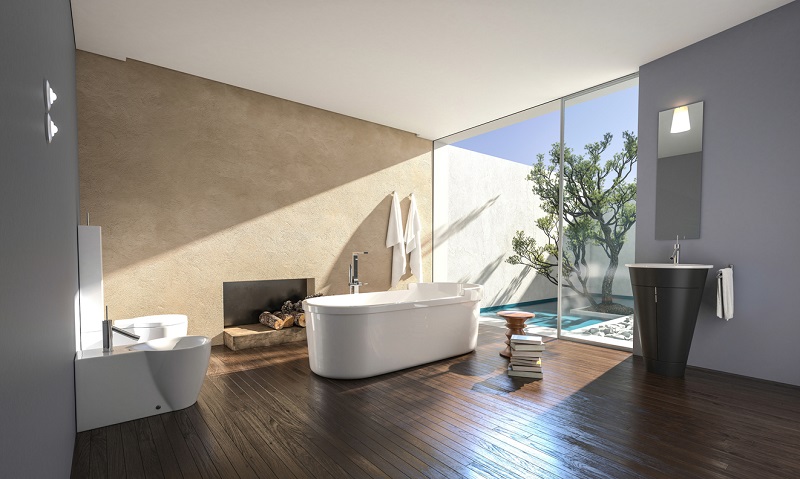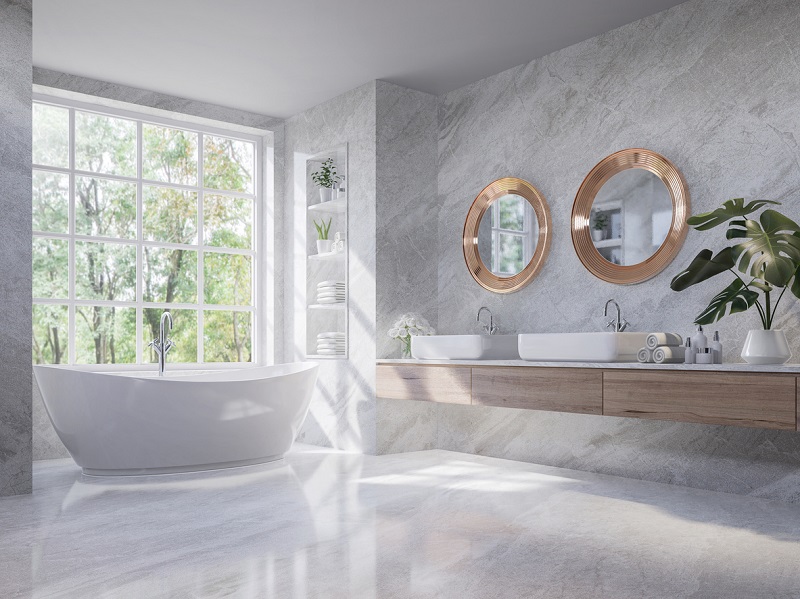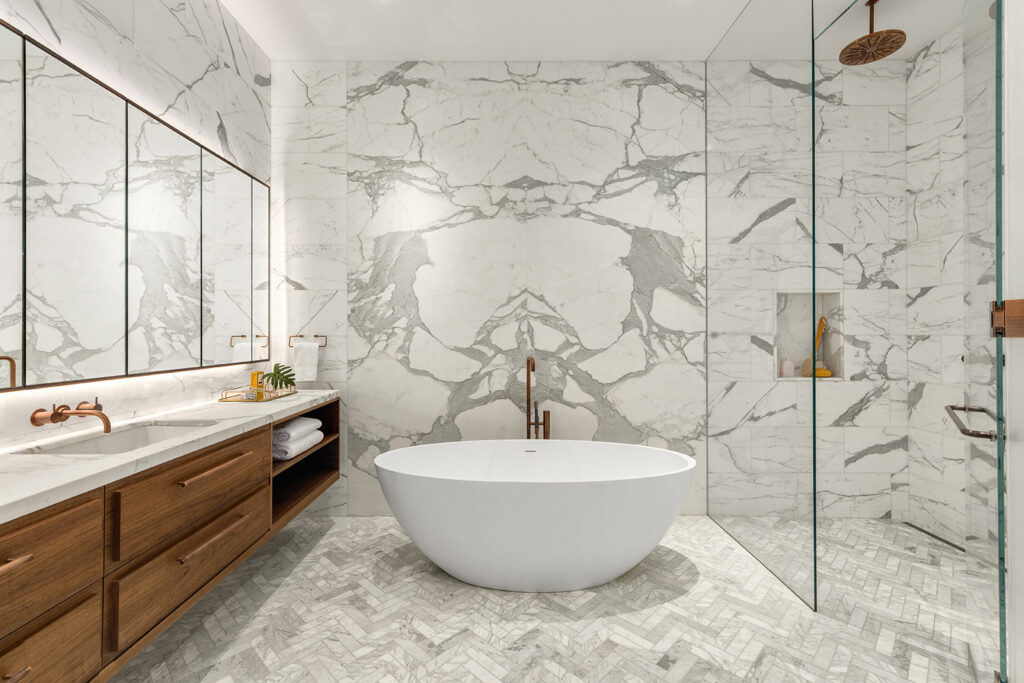One-Piece vs Two Piece Toilet – Pros and Cons- 2025 Expert Guide
When upgrading your bathroom, one of the most important—and often overlooked—decisions is choosing between a one-piece or two-piece toilet. While
On average, a bathroom floor costs anywhere from $11,000-14,000, depending on the material and size of the bathroom itself. When selecting a flooring material, you must balance durability, moisture resistance, comfortability, aesthetics, and cost. So let’s look at what materials are on the market to find the right one for your home.

When it comes to flooring materials, there are many options to choose. Here are the most popular materials on the market and their cost and benefits:
On average, porcelain tile costs around $2-30 per square foot of material. A standard 10-square-foot bathroom ranges from $300-500 for just the material alone. For both porcelain and ceramic tile, you also need to account for the cost of grout, which can add $6 per square foot. Porcelain tile, including installation costs, ranges from $1,000 to-4,000. The reason for porcelain’s costs is because it’s a very durable material to work with. It has high density, making it ideal for the bathroom as it can weather a great deal of punishment. However, its density is also a drawback as porcelain is a heavy material, making it more challenging to work with, which raises its install price.
Ceramic tile costs between $4-115 per square foot, with the price variability depending on the quality of the ceramic, hand-painted, sculpted, or glazed. All these factors affect the final cost. In addition, for both porcelain and ceramic tile, you need to factor in the cost of grout which can add $6 per square foot to the overall cost. Like porcelain, ceramic installation costs will run around $2,000-4000. Ceramic’s high price results from its durability and high water resistance as it won’t react to temperatures and moisture spikes like laminate or wood. However, the grout in between can be quite difficult to clean.
The average cost of vinyl flooring or sheets is roughly $2-5 per square foot, with installation costs ranging from $881-2,000. Vinyl flooring is a PVC material in large flexible sheets, stiff tiles, or interlocking planks. The advantage of vinyl flooring is that it is inexpensive, easy to clean and install, but not durable. In addition, vinyl is a material that is not environmentally friendly and can emit volatile organic compounds.
Stained concrete has a price range from $2-25 per square foot. The hefty price discrepancy depends on the complexity of the stain job itself, with more in-depth and intricate color patterns costing significantly more. Install costs are roughly $3-5 per square foot. Stained concrete is highly durable, has many design options, and is water and stain-resistant. However, this flooring type is not comfortable despite its high quality.
Natural stone price averages around $5-10 per square foot, along with an install cost of roughly $7 per square foot. This makes natural stone among the most expensive floor materials available. However, natural stone is highly durable, water/stain-resistant, non-porous, long-lasting, non-slip, easy to maintain, chip-resistant and has excellent aesthetic appeal.
Bamboo flooring averages $3-9 per square foot. Install costs average $3-4 per square foot. The price discrepancy is due to differences in the quality of the bamboo itself, so it’s important to check the quality of the bamboo before purchasing. Bamboo provides a unique aesthetic and has similar qualities to the hardwood at a much cheaper price point. In addition, it can be refinished and can easily be cleaned with mild soap. Unfortunately, bamboo absorbs moisture and is susceptible to water damage.
Engineered wood has an average cost of $3-13 per square foot. Install costs typically run around $8 per square foot. The material is almost identical to hardwood except it’s manufactured with plywood in addition to having a layer of hardwood on top. As a result, engineered wood provides the look and feel of hardwood at a more affordable price. The material is also more temperature and moisture-resistant compared to hardwood.
On average, Laminate flooring ranges from $1-12 per square foot, depending on the quality of the laminate itself. Installation prices range from $1,400 to $4,000. Laminate flooring is a multi-layer synthetic flooring comprised of resin and fiberboard materials. A photographic layer above is meant to mimic wood or metal. Because it is a synthetic material, it is inexpensive and easy to install. However, laminate is susceptible to moisture damage and is difficult to repair, requiring wholesale replacement.
Cork flooring averages around $5-14 per square foot. The average cost for 100 square feet is around $1000, with low prices ranging around $500-600. Labor costs run roughly $2 additional per square foot. Cork is eco-friendly, a good insulator has a cushioned surface and is lightweight, easy to install and maintain. However, it requires water sealing, cannot handle heavy punishment, is not pet-friendly, and will fade in the sunlight.
When remodeling your bathroom floor, a radiant heating system could be a good fit for your home.
Heated floors use either electricity or boiler heated water to provide heating. Electrical radiant heating costs around $11 per square foot, while hydronic or water-based systems cost $13 per square foot. While hydronic may seem more expensive, it costs less to run than electrical radiant systems as it retains heat for a much longer time. Labor costs make up the bulk of this price tag as the materials are usually only $1.50-2 per square foot.
When choosing your bathroom floor, you should know multiple factors affect your final cost. Here are the primary ones:

The material you choose has a large impact on the overall cost of your bathroom floor. Denser, more durable materials such as natural stone and porcelain will be much more expensive than lightweight materials such as laminate, vinyl, and wood. Additionally, more expensive materials will require less maintenance and last longer than cheaper materials designed to be replaced every ten years. This makes more durable material a long-term investment.
In addition to the initial cost of a material is the labor involved. For example, more durable material such as natural stone is heavier and more difficult to work with than cheaper material such as vinyl, increasing labor costs. Generally, the more dense and heavier the material, the more expensive the labor cost will be.
Similar to labor cost is the job time. Hiring professionals can be quite costly, and the more difficult a material is to install, the more you will pay in overall job time.
There are a wide variety of material vendors available. Because of this, you want to select a trusted company that deals in quality material; otherwise you might end up with low-quality material for your bathroom that can deteriorate or cause issues. To avoid this, apply proper research and locate a trusted vendor for your materials.
With so many different materials on the market, it’s important to do your research and find the right fit for your home. Also, remember that your flooring is a long-term investment, and while it is costly to remodel, costly repairs now will save you a great deal of trouble in the future.

Eric is the founder and president of Badeloft USA. He has been the president of Badeloft’s US division for over ten years and oversees all marketing and branding aspects of Badeloftusa.com.
His expertise lies in small business development, sales, and home and bathroom industry trends and information.
Contact us with any business related inquiries.

Free material samples and tub templates
When upgrading your bathroom, one of the most important—and often overlooked—decisions is choosing between a one-piece or two-piece toilet. While
Small details, including what you place on the floor, can make a big difference when setting up or upgrading your
Plumbing traps may seem like small components, but they are critical in keeping your home safe and odor-free. Two of
When shopping for new bath linens, the difference between a bath towel and a bath sheet can feel subtle, but
Fill out the form below to request a free material sample
"*" indicates required fields
"*" indicates required fields
"*" indicates required fields